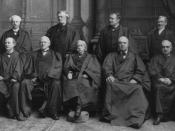Equal Protection is described as "the right of all persons to have the same access to the law and courts and to be treated equally by the law and courts, both in procedures and in the substance of the law". It is similar to the right to due process of law, but in particular applies to equal treatment as an aspect of fundamental fairness. The equal protection clause can be found in the Fourteenth Amendment of the Constitution. It simply states that, "No state shall make or enforce any law which shall abridge the privileges or immunities of citizens of the United States...nor deny to any person within its jurisdiction the equal protection of the laws." In other words, this meant that the Constitution would become 'color-blind'. Military members of all branches are entitled to these fundamental rights.
The U.S. Navy Regulation states that equal protection under the law regardless of race, religion, culture, national origin, gender or political affiliation, is a recognized fundamental human right for all people, including military personnel.
The Regulation goes on to say that equal opportunity shall be afforded to all on the basis of individual effort, performance, conduct, diligence, potential, capabilities and talents without discrimination as to race, color, religion, creed, sex or national origin. It also states that naval personnel shall demonstrate a strong personal commitment to stand on these principles and carry them out. The U.S. Army has a similar statement. The U.S. Army Regulation states that they will provide equal opportunity and treatment for soldiers, civilian employees, and their families without regard to race, color, religion, gender, or national origin. There are several benefits of equal protection for military members. These benefits include high morale of the military members, confidence in the fairness of decisions, selection of the most capable personnel...


